Bolognese Recipe Milk Ground Veal Pork Beef

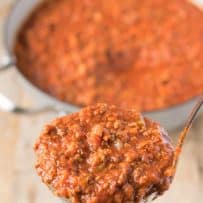
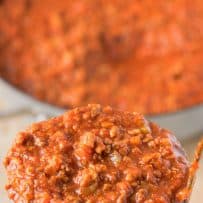
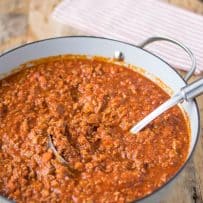
Jump to Recipe
This Traditional Bolognese Sauce recipe is made using all the authentic ingredients like beef, pork, fresh tomato purée, is one of the most popular and comforting Italian dishes. Cooked low and slow for 4 hours to develop a rich, hearty taste. This recipe makes a lot of sauce, but leftovers are even better AND it freezes well too.
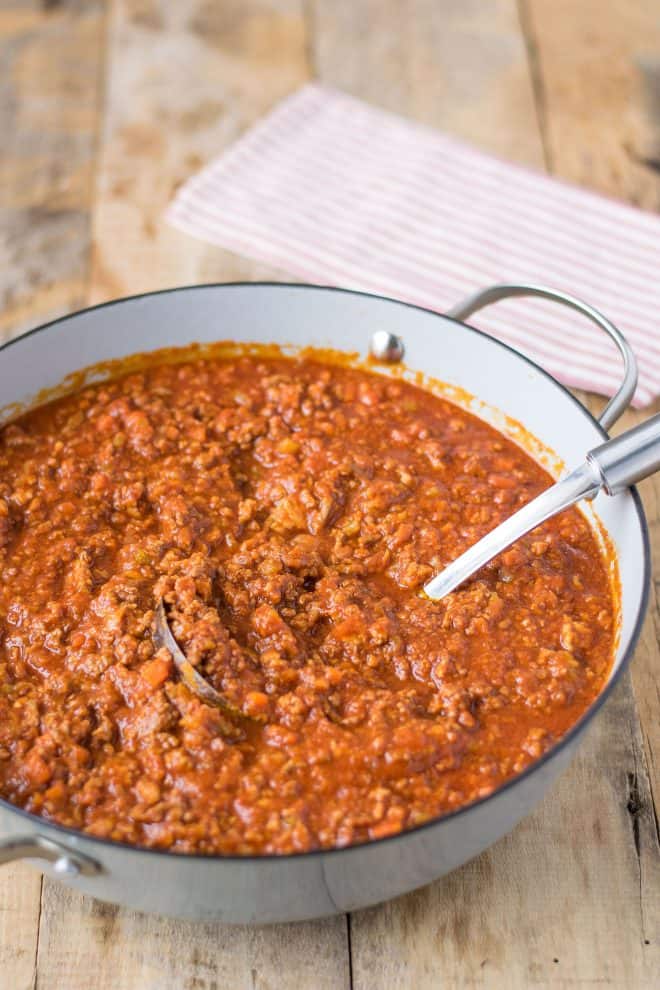
Cook low and slow for the best results
A Traditional Bolognese sauce is a rich, thick meat sauce that needs to cook for 4 hours. Yes, 4 hours! Trust me (I make this almost weekly) and, you can read the comments to back this up.
I've had people say (and I do agree) that after 2 hours it does seem like it's ready and it's pretty good, but 4 is best. I've had questions about adding the milk and that it seems weird. It's not and it's how they do it in Italy. It helps the sauce develop its richness and after 4 hours, you don't even know that it's in there.
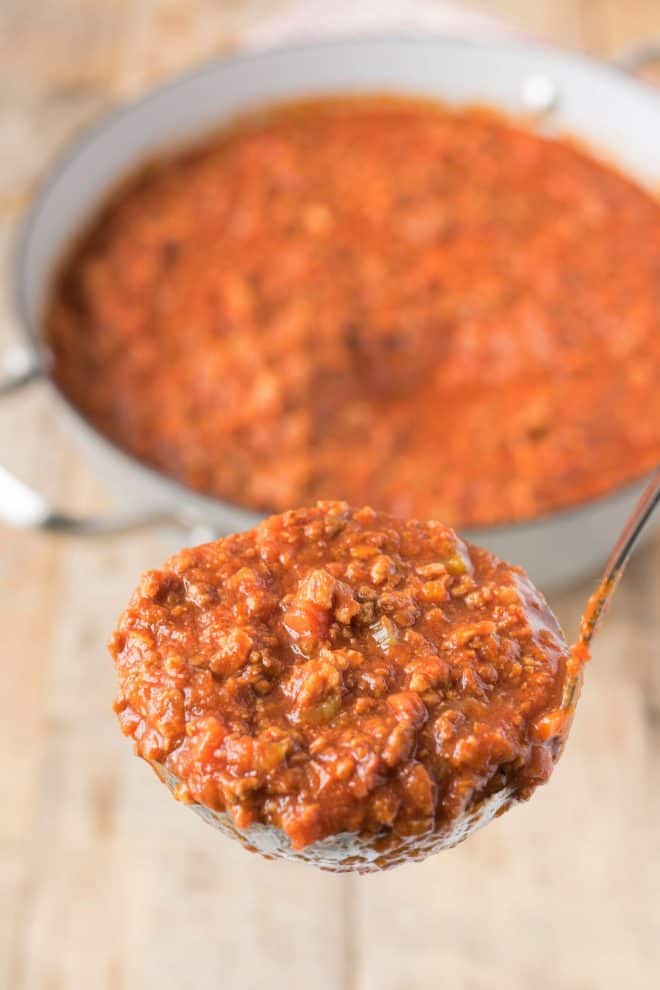
What are the best meats to use for Bolognese?
Usually 50% each of ground beef and pork is used with a really great flavor booster, pancetta (Italian unsmoked bacon). You can use all beef if you're not a pork eater.
White wine is added (white is traditional, but you can use red if you prefer) along with a good quality tomato puree, milk and beef stock. The longer this sauce is simmered, the better the flavor so set aside a good 4 hours for the best result.
White wine is added (white is traditional, but you can use red if you prefer) along with a good quality tomato puree, milk and beef stock. The longer this sauce is simmered, the better the flavor so set aside a good 4 hours for the best result.
When one would expect oregano or basil to be used in an Italian recipe, seasonings are very minimal in Bolognese. Only salt and pepper is used.
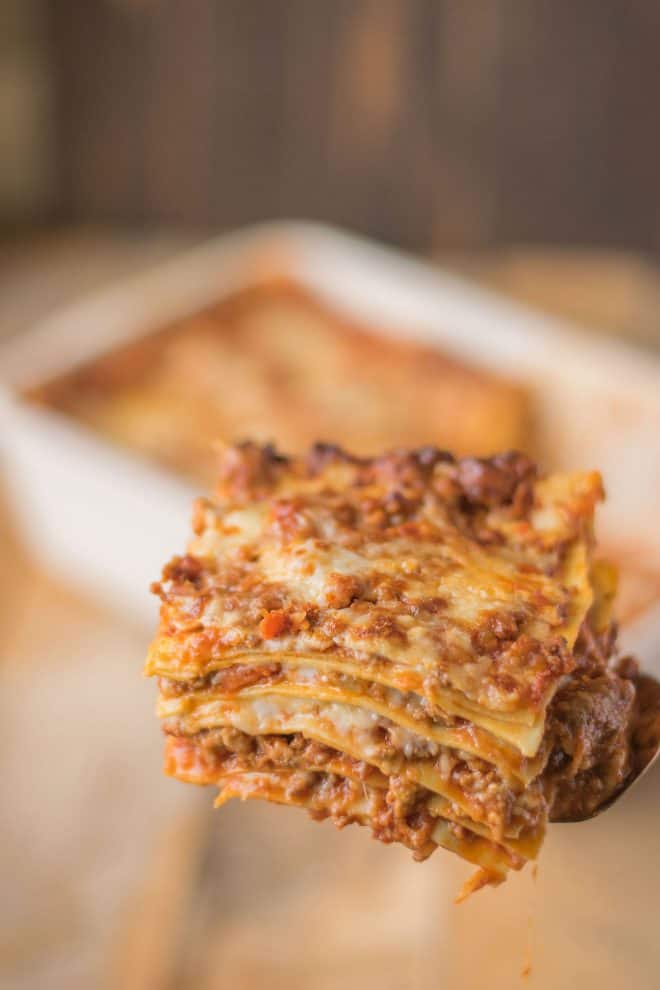
What can you make with this Bolognese?
This sauce is not only used in my Lasagna Bolognese, it can also be served with wide, flat tagliatelle, a pasta that can hold the weight of the sauce.
How much sauce does this recipe make?
This recipe yields 4 quarts/16 cups/3.7 f liters of sauce. You will need a large pan for this and the reason I made so much is because this sauce is going in a lasagna Bolognese (which is also very large and really good!)
What is the difference between a Ragu and Bolognese?
Both are Italian sauces with slight differences, but they are both made with meat and it's the choice of meats that make the difference in the sauces. Bolognese (Ragu all Bolognese) originates from Bologna, Italy. Ragu is from Naples Italy. They both use soffritto (carrots, celery, pancetta) beef broth and tomato sauce, but Ragu does not have wine.
What is a marinara sauce?
Marinara is a tomato based sauce that has not meat. I have an easy recipe for this sauce here easy homemade marinara sauce.
Pan tip
Now, it may see obvious to cook this Bolognese sauce in a stock pan, but this is not the best for helping the sauce reduce. As you can see by the images, I use a wide braising pan which is 11-inches in diameter and 4 quarts and can hold all the ingredients. A 4-quart deep skillet will work also. You can find a good selection of pans on Amazon.
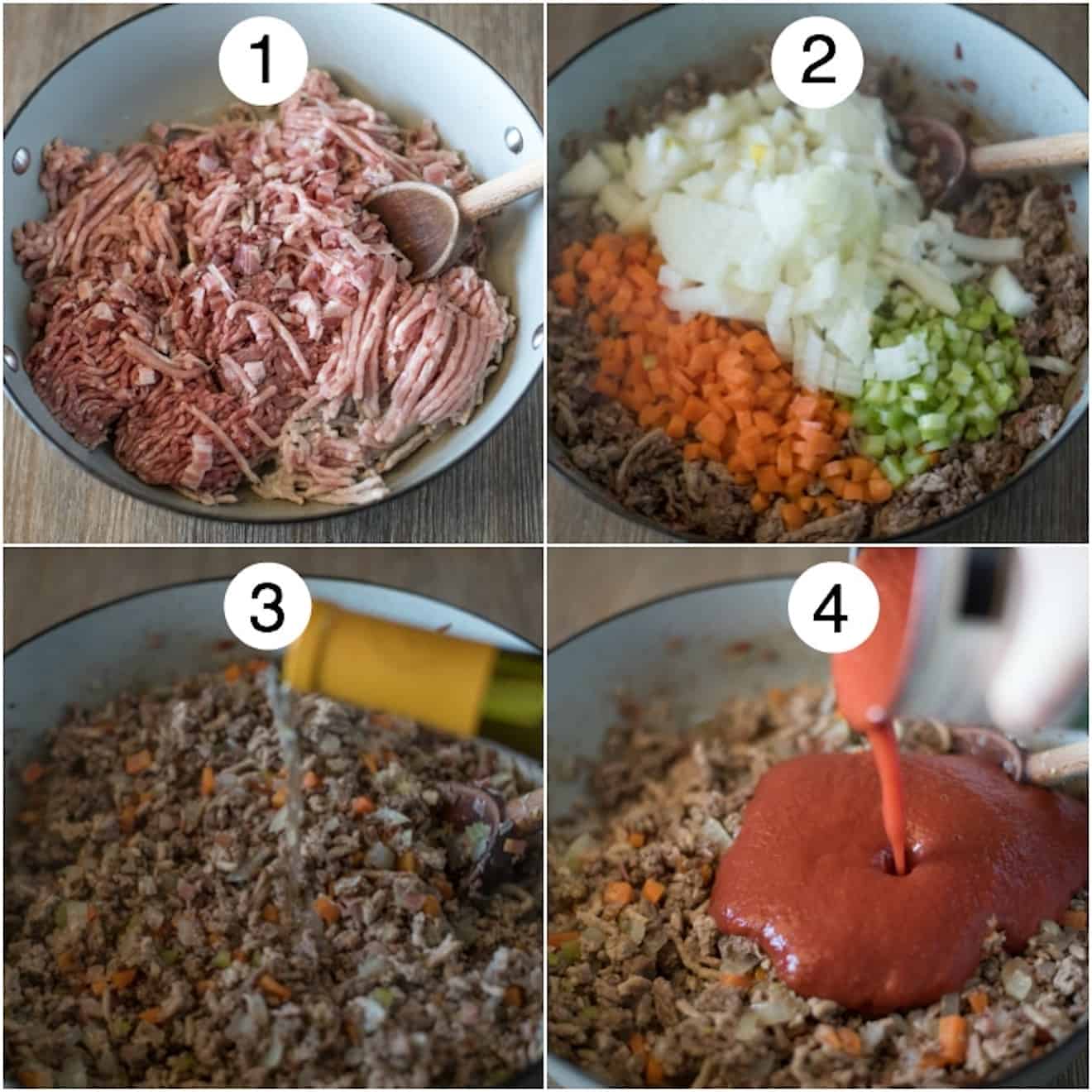
How to Make Traditional Bolognese Sauce – Step by Step
- Cook the meat and vegetables
Brown the beef, pork and pancetta, salt and pepper in olive oil and butter.
- Add the veggies
Chopped onion, celery and carrot, then garlic.
- Add the wine
Stir in the wine and reduce a little.
- Add the other liquids
Add the tomato puree/passata, beef stock and milk. Mix, partially cover and leave for 4 hours.
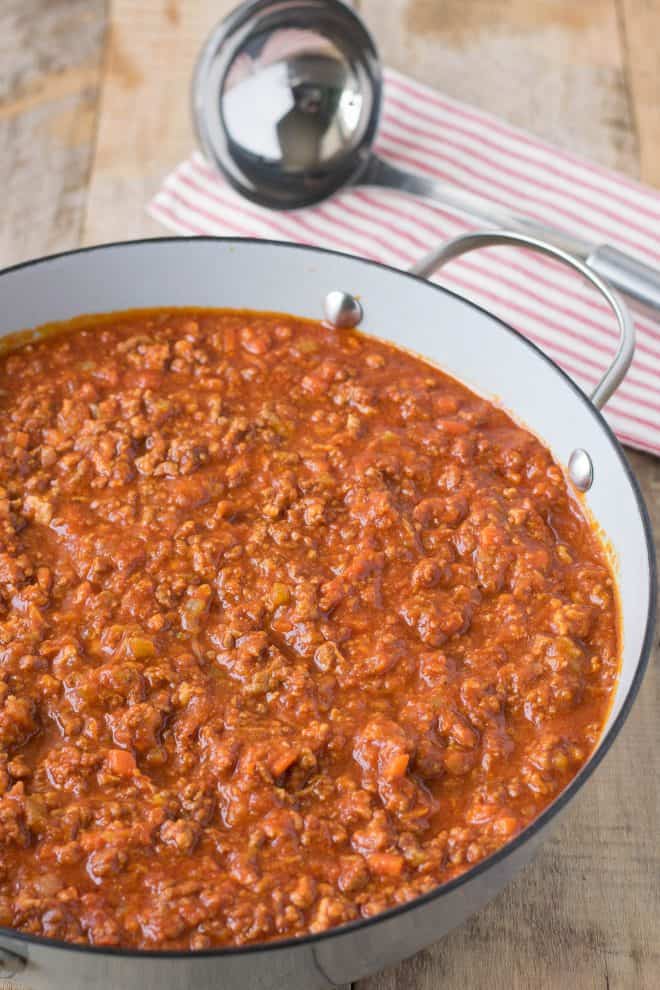
Slow Cooker Method
This is the perfect sauce that can be cooked in the slow cooker. Prepare as the recipe instructs and after step 3, transfer the sauce to a slow cooker pre-heated on high and let it cook away for 4 hours.
The sauce will become quite saucy with the lid on as it produces liquid, so remove the lid to help the sauce thicken.
Tomato Sauce/Purée/Passata
The tomato base for this sauce are good, strained tomatoes from a jar or can that have no other ingredients that is a thick, liquid consistency. This product is called by a few different names around the world, purée, passata or sauce (not tomato ketchup which is also called tomato sauce in the U.K and Australia).
This sauce freezes really well
I know that this recipe makes a lot of sauce, but it is so good I always make a full batch and freeze the rest because I end up craving it. To freeze any cooked leftovers, add the cooled sauce to a container with a good lid and seal well. You can keep it frozen for 3 months. To reheat, defrost in the fridge overnight and reheat in a pan.
How to thicken Bolognese sauce
This recipe thickens as it cooks for 4 hours. If you find that your sauce is not thickening after the 4 hour or is too thin (this could be the result of the meat or vegetables giving off liquid), remove the lid completely and turn up the heat so the sauce bubbles rapidly.
This will allow the excess liquid to evaporate, but you MUST stir the sauce often to prevent it sticking to the bottom of the pan.
Bolognese Sauce too thick
If the sauce is thickening too quickly as it simmers, turn the heat down and cover completely. If your leftovers are too thick (this can happen when the sauce is cold), add to a pan and reheat over medium heat, stirring.
If the sauce is still too thick when it warms up, add a little beef stock, you can also add more tomato puree/passata. You want to reheat slowly to see how much liquid the sauce needs as it heats and add accordingly.
Did you know there is a white Bolognese sauce?' It's true, but it's not exactly white. The name just means it does not have any tomato product added. I recently added my own recipe here: Traditional White Bolognese Sauce.
Prep Time 10 minutes
Cook Time 4 hours
Total Time 4 hours 10 minutes
Ingredients
- 1 tablespoon olive oil
- 1 tablespoon unsalted butter
- 1 ½ pounds (680 grams) 80/20 ground beef
- 1 ½ pounds (680 grams) ground pork
- 6 ounces (170 grams) pancetta, chopped finely
- ½ teaspoon salt
- ¼ teaspoon black pepper
- 11 ounces (311 grams) large onion, finely chopped
- 2 celery stalks, finely chopped
- 6 ounces (1 large) carrot, finely chopped
- 5 garlic cloves, grated or finely chopped (optional, see note)
- 1 cup (236 ml) white wine, or red if you prefer
- 3 1/2 cups (448 grams) 28 ounces good quality can tomato puree/passata,
- 1 cup (236ml) milk
- 1 cup (236 ml) beef stock (low sodium if possible) * see note
Instructions
- To a large, wide pan or a large high-sided skillet. Add the oil and butter over medium-high heat. When the butter is melted and bubbly, add the beef, pork, pancetta, salt, pepper. Brown, breaking up the meat while cooking.
- When the meat is browned, add the onion, celery and carrots, mix well and cook for 3 minutes. Stir in the garlic and cook for 2 more minutes.
- Add the wine, stir and allow to cook and reduce slightly for about 3 minutes. Add the tomato purée, milk, stock and mix well.
- Partially cover and simmer for 4 hours, stirring often to prevent it sticking to the bottom. If any fat rises to the top, use a spoon to skim it off.
- If you find that the liquid is not reducing, remove the lid completely and make sure the sauce is bubbling. It may get messy.
- When done, taste for seasoning and adjust to your taste.
Notes
Garlic is not traditional, but I have had many requests as to how much to add so it is included in the recipe.
Taste your stock, if it is salty, you may need to adjust the amount of salt in the dish
Nutrition Information
Yield
16 Serving Size
1 cup
Amount Per Serving Calories 270 Total Fat 18g Saturated Fat 7g Trans Fat 0g Unsaturated Fat 10g Cholesterol 57mg Sodium 171mg Carbohydrates 9g Fiber 2g Sugar 4g Protein 16g
Source: https://culinaryginger.com/traditional-bolognese-sauce/
0 Response to "Bolognese Recipe Milk Ground Veal Pork Beef"
Post a Comment